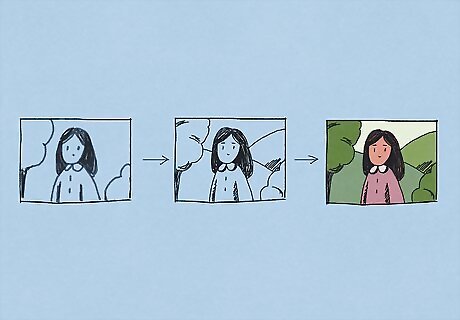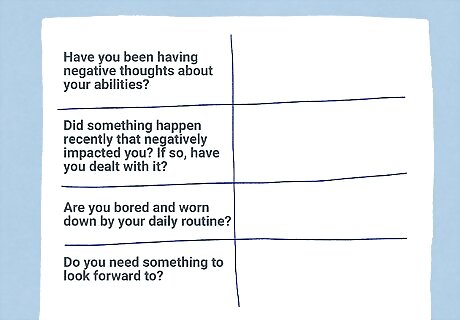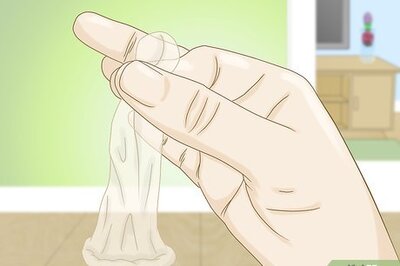
views
- Take small steps to change your daily habits, practice acknowledging your achievements, and consider revisiting hobbies you used to love.[1]
- Be kind to yourself by turning negative thoughts into positive ones and repeating empowering mantras.
- Step out of your comfort zone by going someplace new or trying new things.
Make small changes to create new habits.

Take action by starting with doable steps. If you're struggling with severe apathy, it's unwise to dive straight into the deep end of new responsibilities and ambitions. Make small changes at first and gradually work toward more significant responsibilities. Each step you take forward is a step away from apathy. For example, if you feel like all you can do in a day is wake up and make it to the couch, it's probably not realistic to decide to run a marathon. Try taking a short walk each day instead. If you used to love painting but it feels hard right now, try sketching or even coloring instead.
Acknowledge your achievements.

A small win is still a win. Even if you think taking out the trash is not a big deal, give yourself a pat on the back for getting the task completed. It doesn’t matter how big or small, try to honor yourself by recognizing the things you can do rather than focus on those things you believe you cannot. You could even give yourself a treat when you accomplish something. It could be taking a relaxing bubble bath or buying a new book you might like to read.
Revisit a hobby you used to love.

You might reignite the passion you used to feel for it. When you feel apathetic, you start losing connections to the things that once gave you joy. It can even be difficult to remember what it was that used to get you excited. This is tough to deal with, but you can make changes. Think of an activity you used to love and spend some time doing that. Did playing your guitar used to bring you joy? Pull it out of the dusty case and remember what it feels like. Were you an eager reader who always read the best sellers? Pull a book off the pile you’ve wanted to read and skim through it. Did you enjoy laughing with friends? Maybe your best friends haven't heard from you in days, weeks, or months. It’s time to make contact.
Swap negative thoughts for positive ones.

Focus on changing your inner voice. A thought can change a feeling. In order to feel better, pick a better thought. If you notice that you're having a lot of negative thoughts, you can consciously try to change that pattern. Focus on generating positive thoughts to replace the negative ones. If you catch yourself thinking negative thoughts about yourself, tell yourself, "Stop!" Then replace the thought with something positive such as, "I am filling my mind with positive ideas that will change my beliefs. I am changing my life." For example, if you have the thought “There is no point in trying, because I know I will fail,” change it to something like, “Failure is an opportunity to learn. If I don’t get it right this time, I can always try again.”
Use positive self-talk to build your self-confidence.

How you talk to yourself matters! Be the first person to congratulate yourself on any job well done. Try to see your positive traits in the way others see you. You are doing great, so just take time to remind yourself that you're awesome. Post notes around your house that are positive. For example, put a note on the bathroom mirror that says something like, "You are smart and kind."
Step out of your comfort zone.

Challenge yourself to add something new to your routine. Making any kind of change can be tough when you're dealing with apathy, but commit to changing at least one thing in your daily routine. This might help spark a new interest or give you some additional energy. Add something new to your exercise program. If you normally hike, try going for a swim instead. Talk to someone different at work. Strike up a conversation with a co-worker you don't really know. You might make a new work buddy.
Be physically active every day.

Add a workout to boost your mood and give you energy. Periods of extreme apathy can be reversed, sometimes by taking the smallest of steps. Getting outside and using your body can be enough to jolt yourself out of your haze. If the idea of exercise makes you want to head for the couch, challenge yourself to do just 10 minutes of movement. Even that small amount can help! You don't have to jump immediately into running 5k races and swimming 10 miles (16 km) each morning. Go slowly and do what you're ready for. Start with light stretches and calisthenics each morning or go for a brisk walk around the neighborhood.
Change your scenery.

Go on vacation or even move. Moving elsewhere can give you the change in scenery you need. If you're feeling stuck someplace where you don't know people, you don't feel comfortable, or you don't enjoy being, it may be helpful to change your residence. While it's true that you can't always outrun your problems by moving, it can be a spark that some people require. If you are able, try taking a vacation. Even a long weekend away can do wonders to help with apathy. It's okay if you can't actually take a break. Try exploring a new neighborhood in your city or try a new hiking trail near you.
Identify the root cause of your apathy.

Ask yourself some questions to gauge your emotions. This might feel challenging, but it’s helpful to take a sort of personal inventory of your feelings. It can help you be more mindful of what's going on in your life and how you can make positive changes. The answers to these questions might help you figure out why you’re feeling apathetic, which might help you find a solution. Be honest with yourself and try to avoid judging your emotions. Try questions like: Have you been having negative thoughts about your abilities? Try adding positive self-talk to your day. Tell yourself, "You are making real progress in reaching your goals," or similar. Did something happen recently that negatively impacted you? If so, have you dealt with it? Maybe you lost your job and are having trouble dealing with it. Try making a plan for what you want to do moving forward. Are you bored and worn down by your daily routine? Change it up! Even trying a new spot to grab lunch can make you feel better. Do you need something to look forward to? Make a plan. Try to plan a vacation or a fun activity, like dinner with friends.
Talk to your doctor about possible medical causes.

Apathy can be a warning sign of several serious conditions. If you've been dealing with severe apathy for a couple of weeks or more, make an appointment to talk to your doctor. They will likely ask you a lot of questions about what you've been going through and do a physical exam. They might run some tests if they think apathy is a sign of a neurological condition. This might sound scary, and it's okay to be nervous. Remember your doctor is there to help. Apathy can occur in people with conditions like schizophrenia, Parkinson's, Alzheimer's, and Huntington's Disease. Don't assume that just because you have been feeling apathetic that you have one of these issues. Check-in with your doctor just to make sure. It's okay to feel stressed about this.
See a counselor if you still need some help.

If you're really struggling, don't go it alone. Schedule an appointment to talk with a licensed therapist and discuss your struggles with apathy. Just scheduling the appointment and knowing there will be someone to talk to can help. Ask your doctor for a referral to a counselor. They can help determine is you're suffering from clinical depression, which is often related to apathy. You can also ask friends and family members if they have any recommendations for counseling.


















Comments
0 comment